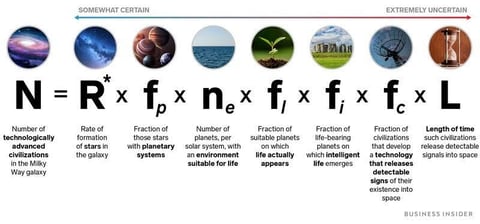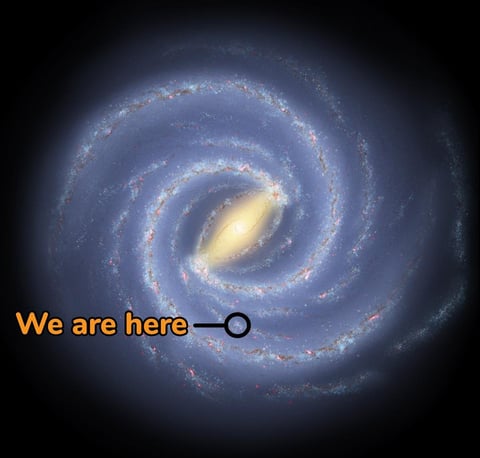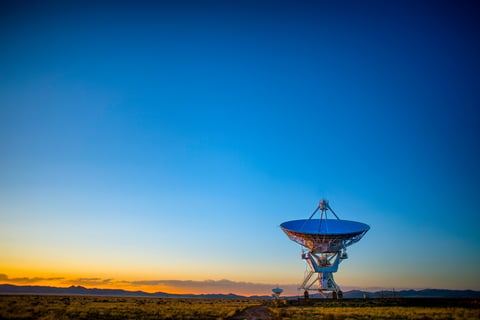The Fermi Paradox
SCIENCE
Nitin Karthik
12/4/20244 min read
Where Are the Aliens?
The universe is vast, so vast that it’s nearly incomprehensible. With billions of galaxies, each containing billions of stars, many orbited by planets, the sheer numbers suggest that life should be common. If so, why haven’t we encountered any evidence of extraterrestrial civilizations? This is the essence of the Fermi Paradox, named after physicist Enrico Fermi, who famously asked, "Where is everybody?" Exploring this paradox raises profound questions about the nature of life, technology, and the future of humanity itself.


The Statistical Case for Extraterrestrial Life
The argument for extraterrestrial civilizations begins with numbers. Astronomers estimate that our galaxy, the Milky Way, has around 100–400 billion stars, with a substantial fraction hosting planets. The discovery of exoplanets (planets outside our solar system) has revealed that many stars have planets in the so-called habitable zone, where conditions might allow liquid water, a key ingredient for life as we know it. Using this data, scientists like Frank Drake have attempted to estimate the number of intelligent civilizations in the galaxy. The Drake Equation, though speculative, provides a framework for considering factors like the number of habitable planets, the likelihood of life arising, and the chances of intelligent life developing technologies detectable across interstellar distances. Even with conservative estimates, the numbers suggest there should be numerous advanced civilizations in the galaxy. Yet, no one has made contact—or at least, we have no evidence of it.


The Silence of the Stars
The Fermi Paradox highlights the gap between these optimistic probabilities and the reality of cosmic silence. Various explanations have been proposed, divided broadly into three categories: we are alone, we are isolated, or we are oblivious.
Hypothesis 1: We Are Alone
One explanation is that intelligent life is exceedingly rare or even unique to Earth. While life may emerge in many places, the transition from simple microorganisms to intelligent, technological civilizations could be extraordinarily unlikely. This perspective is supported by the Rare Earth Hypothesis, which suggests that Earth’s combination of factors—stable climate, protective magnetic field, large moon, and more—might be unique or exceptionally rare. Even if microbial life is common, the jump to intelligence and space-faring technology might require such a rare convergence of circumstances that humanity is an outlier.


Hypothesis 2: We Are Isolated
Another possibility is that intelligent civilizations exist but remain isolated due to the challenges of interstellar communication or travel. The distances between stars are vast, and even with advanced technology, the energy and time required for meaningful interaction might be prohibitive. This scenario aligns with the idea of a galactic quarantine: extraterrestrial civilizations could deliberately avoid contact with us, either because they view us as primitive or to protect us from cultural or technological disruption. This is sometimes referred to as the zoo hypothesis—Earth might be under observation, much like animals in a wildlife reserve, with advanced civilizations waiting for us to reach a certain level of maturity before making contact.


Hypothesis 3: We Are Oblivious
A third explanation is that evidence of extraterrestrial life exists, but we either lack the ability to detect it or fail to recognize it. Signals from alien civilizations might use technologies beyond our understanding or occur in formats we don't recognize as communication. For example, an advanced civilization might use quantum entanglement or neutrino-based communication, technologies far beyond our current capabilities. Similarly, extraterrestrial life might not resemble anything we expect. We often assume intelligent beings will be carbon-based lifeforms like us, but they could be radically different—silicon-based, energy-based, or even forms of artificial intelligence. These beings might exist in environments entirely alien to us, like the atmospheres of gas giants or the subsurface oceans of icy moons, making their detection exceedingly difficult.


The Great Filter
One particularly sobering explanation for the Fermi Paradox is the concept of the Great Filter, which suggests that there’s a nearly insurmountable barrier preventing life from reaching the stage of advanced technological civilization. This filter could occur at any point: the emergence of life, the development of intelligence, or the sustainability of a civilization. If the Great Filter lies in our past, it means we’ve already overcome the most difficult hurdles, which would make our existence truly exceptional. However, if the filter lies in our future, it implies that advanced civilizations inevitably destroy themselves through war, environmental collapse, or other existential threats before they can achieve interstellar communication or travel.


What Does It Mean for Humanity?
The Fermi Paradox forces us to confront our place in the universe. If we are alone, it underscores the uniqueness and fragility of life on Earth, emphasizing the importance of preserving our planet. If we are not alone, the silence might warn us of dangers we have yet to encounter or suggest that humanity still has much to learn before joining a broader galactic community.
Efforts like the Search for Extraterrestrial Intelligence (SETI) continue to scan the skies for signals, while missions to Mars, Europa, and Enceladus aim to uncover microbial life in our solar system. These endeavors reflect our deep-seated curiosity and desire to answer one of the most profound questions of all: Are we alone?
The Fermi Paradox remains a tantalizing mystery, challenging our understanding of life, the universe, and our role within it. Whether the silence of the stars is due to the rarity of life, the barriers of communication, or our own limitations, it invites us to reflect on the nature of existence and the future of humanity. In seeking answers, we might not only discover extraterrestrial life but also learn more about ourselves and our fragile place in the cosmos.
